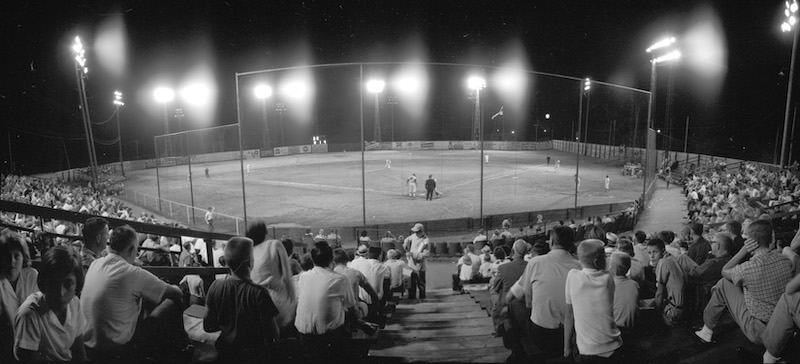
Published Aug. 23, 1962: Here’s the scene at Petrakis Park Wednesday night as the new lights beyond the outfield fence were turned on for the first time during the Community Night game between the Midwest Dodgers and Fox Cities. The Dodgers won the game, 5-1, to move within four games of the league-leading Foxes. (The Dodgers are finishing their home season in Dubuque after the Keokuk franchise folded.)
May/June 2023 (Volume 15, Issue 3)
By John T. Pregler
Charlie Finley had been looking for a magic bullet to turn his Kansas City Athletics baseball club into a money-making winner since purchasing controlling interest of the team in 1960. In October 1967, the tenacious Finley finally won the right from Major League Baseball owners to move his Kansas City Athletics to Oakland for the 1968 season in hopes of striking gold in the San Francisco Bay area. Kansas City fans and Missourians across the state were horrified. After all, the A’s had only been in Kansas City for 13 seasons.
U.S. Sen. Stuart Symington of Missouri immediately got involved and was vocal in his dissatisfaction with the way he felt Kansas City was being treated given the investment in treasure and emotion they had poured into their A’s. Symington threatened to go after MLB’s antitrust exemption in Congress if a satisfactory remedy was not quickly found. MLB offered Kansas City an opportunity for an expansion team in 1971. Symington wanted better.
At the end of the 1967 season, Finley corralled his Kansas City A’s, along with the teams’ rising-stars Rick Monday, Jim “Catfish” Hunter, Joe Rudi, rookie Reggie Jackson, and packed up their bats, balls and gloves and left Cowtown for the California coast as MLB continued its decade-long invasion of Pacific Coast League cities.
The move would ultimately lead to Kansas City hosting their first minor league team in Dubuque, further establishing the city’s legacy in professional baseball.
MLB expansion
MLB long considered expansion into additional U.S. cities in the 1960s as a way to fight the growing popularity of the National Football League. In response to Symington, MLB decided to expand the American League and National League by two teams each for the 1969 season. The NL would expand into San Diego with the Padres and into Montreal with the Expos. The AL would expand into Seattle with the Pilots and Kansas City would, after one year without MLB baseball, have the Kansas City Royals.
Ewing Kauffman, a wealthy pharmaceutical-industry entrepreneur, purchased the rights to the Royals franchise in January 1968 and went to work building a big-league organization in preparation for Opening Day of the 1969 season. Kansas City baseball fans were cautiously optimistic. Kauffman hired Cedric Tallis as his general manager. Tallis had worked for the Los Angeles Angels as a business manager when they left the Pacific Coast League and entered the AL in the 1961 expansion. Kauffman and Tallis next hired Lou Gorman, an executive in the Baltimore Orioles organization, as director of player development. Tallis and Gorman knew what it would take to build a club and a farm system for the Royals.
The Royals would get to select unprotected MLB players from other AL teams in the 1968 expansion draft. The Royals would draft 30 players including All-Star catcher Ellie Rodriguez from the New York Yankees and All-Star outfielder Pat Kelly from the Minnesota Twins. The Royals also drafted future Hall of Famer Hoyt Wilhelm from the Chicago White Sox, but Wilhelm never appeared in a Royals uniform, having been traded to the California Angels in December of 1968. More players would be needed to develop a pipeline of young talent for the future. That meant organizing a minor league farm system and finding existing minor league teams that were for sale or were unaffiliated with an MLB team. Tallis had only a few months to build an organization in time for the 1968 minor league season. He would do so in Dubuque.
TO READ THE ENTIRE STORY AND OTHER FASCINATING STORIES ABOUT IOWA HISTORY, subscribe to Iowa History Journal.
